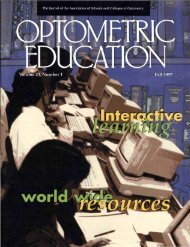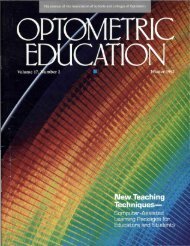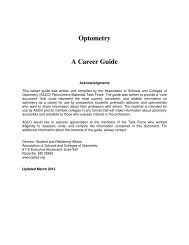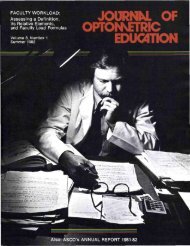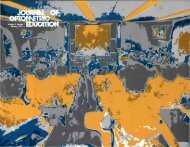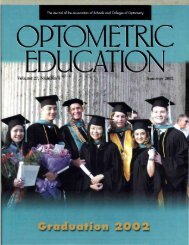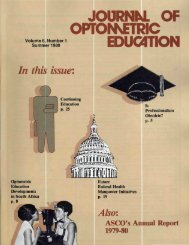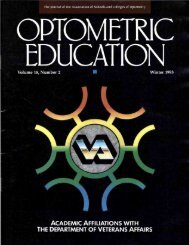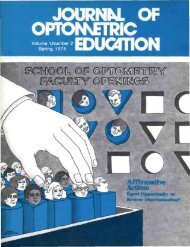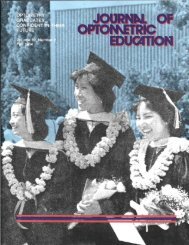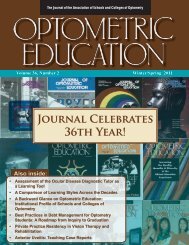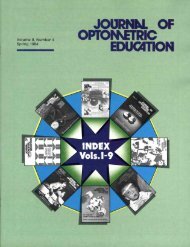Spring 1992, Volume 17, Number 3 - Association of Schools and ...
Spring 1992, Volume 17, Number 3 - Association of Schools and ...
Spring 1992, Volume 17, Number 3 - Association of Schools and ...
You also want an ePaper? Increase the reach of your titles
YUMPU automatically turns print PDFs into web optimized ePapers that Google loves.
We cannot deny the existence <strong>of</strong><br />
ethical questions within colleges <strong>and</strong><br />
universities that are expected to serve<br />
a variety <strong>of</strong> interests both within <strong>and</strong><br />
outside <strong>of</strong> the higher education community.<br />
As a private college, how do<br />
we find moral balance in decisions<br />
weighing faculty salaries against tuition<br />
levels, or in decisions concerning<br />
admission st<strong>and</strong>ards during periods <strong>of</strong><br />
declining enrollments? Do we, the<br />
faculty <strong>and</strong> administration, accept<br />
appropriate accountability for the<br />
failure <strong>of</strong> students to learn? Are we just<br />
in the application <strong>of</strong> st<strong>and</strong>ards for promotion<br />
<strong>and</strong> tenure, or do we exhibit<br />
pr<strong>of</strong>essional bias <strong>and</strong> insensitivity?<br />
It is critical that we continually reflect<br />
upon our practices. The faculty member<br />
or administrator who fails to do<br />
this will be less effective in his or her<br />
role. To be directed only by tradition<br />
or custom limits our growth as moral<br />
beings. Ethical action arises when an<br />
individual begins to reflect on what<br />
principles will govern his or her actions,<br />
particularly when those actions involve<br />
the rights <strong>and</strong> interests <strong>of</strong> other persons.<br />
You have heard three speakers<br />
address the topic <strong>of</strong> ethics from varying<br />
perspectives, but all with the underlying<br />
assumption that ethics, moral<br />
judgment, is central to making right<br />
decisions. I invited these speakers<br />
because in one way or another they<br />
have served as role models, as mentors,<br />
as teachers in my development. They<br />
are individuals <strong>of</strong> integrity, who,<br />
through word <strong>and</strong> action, harbor <strong>and</strong><br />
express a moral philosophy much<br />
better than I could do. Their messages<br />
were more for my ears than yours. They<br />
contain advice <strong>and</strong> challenge designed<br />
to aid me in my role as president.<br />
It is important that I reflect upon the<br />
values <strong>and</strong> personal qualities which<br />
these leaders embrace. These include<br />
the commitment to serve the common<br />
good, to generate st<strong>and</strong>ards <strong>of</strong> excellence<br />
<strong>and</strong> hold themselves to such<br />
st<strong>and</strong>ards, to lead lives <strong>of</strong> integrity<br />
which do not exhibit differences between<br />
word <strong>and</strong> deed, <strong>and</strong> to recognize<br />
fundamental equality in all circumstances.<br />
These values are essential to<br />
the presidency.<br />
William May, a scholar in ethics,<br />
notes that the moral disposition that<br />
the pr<strong>of</strong>essional brings to the organization<br />
shapes his or her approaches to<br />
problems . . . (<strong>and</strong>) the level at which<br />
we tackle them. Perhaps the more<br />
sanguine message in May's writing is<br />
the recognition that ethics is the fibre,<br />
the resources with which we survive<br />
moral crisis to function another day.<br />
My objective is to begin to shape a<br />
concept <strong>of</strong> moral philosophy for the<br />
New Engl<strong>and</strong> College <strong>of</strong> Optometry,<br />
to recognize that I, together with the<br />
broader college <strong>and</strong> pr<strong>of</strong>essional community,<br />
have the responsibility to<br />
influence through definition <strong>and</strong> action<br />
our ethical culture <strong>and</strong> to strive to<br />
attain higher levels <strong>of</strong> both individual<br />
<strong>and</strong> institutional objectives. This need<br />
not be difficult. It can be achieved<br />
through consistent attention to basic<br />
human values.<br />
Let me close with words from<br />
Kenneth Wenker's book, Foundations <strong>of</strong><br />
Pr<strong>of</strong>essional Morality:<br />
"It we want to do the right kinds<br />
<strong>of</strong> actions consistently, we need first<br />
to be persons <strong>of</strong> moral character . . .<br />
A good underst<strong>and</strong>ing <strong>of</strong> right <strong>and</strong><br />
wrong comes less out <strong>of</strong> sophisticated<br />
ethical theories <strong>and</strong> more out <strong>of</strong> a<br />
concern for humanity... an awareness<br />
<strong>of</strong> fundamental human equality, <strong>and</strong><br />
a healthy relationship between reason<br />
<strong>and</strong> emotion."<br />
Products that help<br />
your patients<br />
love their lenses.



